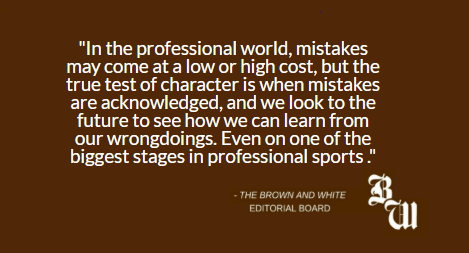Oakland Athletic pitcher Mike Fiers dropped a bombshell in early November 2019 that would shape the narrative of the entire Major League Baseball offseason.
Fiers, who formerly pitched for the Houston Astros, made the decision to release details to The Athletic of cheating that occurred within the Astros organization during his time there.
Journalists Ken Rosenthal and Evan Drellich of The Athletic struck gold when they were the first to hear about the scandal, and on Nov. 12, 2019, they released the news of what is arguably the biggest cheating scandal in professional sports history.
In their 2017 home games, the Astros had used an electronic system to steal signs from opposing catchers and would communicate the signs to their pitchers in real time.
Just as you thought the news couldn’t get any bigger, this was the first time in franchise history that the Astros won the World Series — the same year that they are exposed for their cheating scandal. Coincidence?
While there is nothing wrong with figuring out your opponent’s signs, doing so with electronic assistance was against the rules.
Following this article, all sorts of investigations conducted by the MLB took place. On January 13, 2020, MLB Commissioner Rob Manfred confirmed that the Astros had illicitly used a video camera to steal signs.
Baseball fans all over the world were shocked, disgusted and confused among many other things. Other fans criticized Fiers, whose bold decision to publicly expose his former team sparked many to label him as “a snitch.”
A crucially difficult position to be in is when you spot illicit behavior by someone else and are unsure about whether to keep it to yourself or to publicize it for the sake of the community. It becomes even more difficult when you are involved.
One could make the argument that Fiers could have simply addressed his Athletics team and made them aware of the Astros’ cheating habits rather than approaching the media. Others may argue that Fiers did the right thing and should not be criticized.
It was wrong for Fiers to refrain from addressing this issue throughout the entire 2017 season, when he was a part of the team and knew what was going on, especially when he personally benefited from the cheating after winning the World Series.
But at the end of the day, you never know how Fiers truly felt after each game. What if Fiers didn’t come out with the scandal because he didn’t want to let his teammates down? What if he one day realized that he would feel awful if this were happening against his team?
It may have taken time for Fiers to publicly expose the cheating scandal, but the mere fact that he ended up doing it shows that the cheating was biting into his core. Fiers admitting to the Astros’ wrongdoings embodies a major value of what students at Lehigh are learning everyday.
College is the time for self-growth. Fiers’ integrity and ability to come to terms with himself and others after committing a wrongdoing exemplifies the culture that Lehigh strives to build and teach its students.
As college students, we are bound to continue to make mistakes. What’s important is that we recognize and admit to those mistakes, regardless of the consequences, and for the greater good of oneself and the community.
Beyond college, people are bound to make mistakes. It’s a part of being human and it’s a part of the learning process — navigating our world. In the professional world, mistakes may come at a low or high cost, but the true test of character is when mistakes are acknowledged, and we look to the future to see how we can learn from our wrongdoings. Even on one of the biggest stages in professional sports.
Owning up to mistakes is the right thing to do. It’s the Fiers thing to do.






Comment policy
Comments posted to The Brown and White website are reviewed by a moderator before being approved. Incendiary speech or harassing language, including comments targeted at individuals, may be deemed unacceptable and not published. Spam and other soliciting will also be declined.
The Brown and White also reserves the right to not publish entirely anonymous comments.